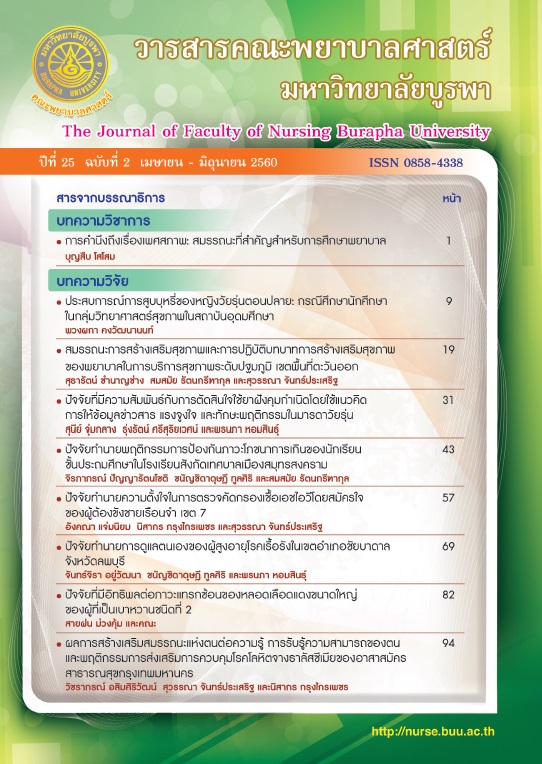ปัจจัยทำนายพฤติกรรมการป้องกันภาวะโภชนาการเกินของนักเรียนชั้นประถมศึกษาในโรงเรียนสังกัดเทศบาลเมืองสมุทรสงคราม (Factors Predicting Preventive Behaviors for Overweight among Primary School Students in Samut Songkhram Municipality School)
คำสำคัญ:
พฤติกรรมการป้องกันภาวะโภชนาการเกิน, นักเรียนชั้นประถมศึกษา, Preventive behaviors for overweight, primary school studentบทคัดย่อ
บทคัดย่อ
การวิจัยครั้งนี้มีวัตถุประสงค์เพื่อ ศึกษาปัจจัยทำนายพฤติกรรมการป้องกันภาวะโภชนาการเกินของนักเรียนระดับชั้นประถมศึกษาในโรงเรียนสังกัดเทศบาลเมืองสมุทรสงคราม กลุ่มตัวอย่างได้แก่ นักเรียนระดับชั้นประถมศึกษาปีที่ 5-6 ในโรงเรียนสังกัดเทศบาลเมืองสมุทรสงคราม ซึ่งได้มาด้วยการสุ่มอย่างง่าย จำนวน 127 คน เครื่องมือที่ใช้ในการเก็บรวบรวมข้อมูล ประกอบด้วย แบบสอบถาม
9 ชุด ได้แก่ ข้อมูลส่วนบุคคล ความรู้เกี่ยวกับการป้องกันภาวะโภชนาการเกิน เจตคติเกี่ยวกับการป้องกันภาวะโภชนาการเกิน การเข้าถึงแหล่งขายอาหาร การจัดการรายได้ของนักเรียน กิจกรรมที่สนับสนุนในการออกกำลังกาย การได้รับข้อมูลข่าวสาร การได้รับแรงสนับสนุนจากบุคคลในครอบครัว ครู เพื่อน และพฤติกรรมการป้องกันภาวะโภชนาการเกิน เก็บรวบรวมข้อมูลโดยให้กลุ่มตัวอย่างตอบแบบสอบถามในห้องเรียนในชั่วโมงที่นัดหมาย วิเคราะห์ข้อมูลด้วยสถิติพรรณนา และสถิติสมการถดถอยพหุคูณแบบขั้นตอน
ผลการวิจัยพบว่า พฤติกรรมการป้องกันภาวะโภชนาการเกินของกลุ่มตัวอย่างโดยภาพรวมอยู่ในระดับปานกลาง (M = 3.23, SD = 0.46) และปัจจัยที่สามารถร่วมทำนายพฤติกรรมการป้องกันภาวะโภชนาการเกิน ได้แก่ การเข้าถึงแหล่งอาหาร (b = -.371) การได้รับแรงสนับสนุนจากบุคคลในครอบครัว ครู เพื่อน (b = .233) การจัดการรายได้ของนักเรียน (b = -.267) และกิจกรรมที่สนับสนุนในการออกกำลังกาย (b = .211) ซึ่งปัจจัยดังกล่าวสามารถร่วมกันทำนายพฤติกรรมการป้องกันภาวะโภชนาการเกินได้ ร้อยละ 39.5 (R2 = .395) จากผลการวิจัยมีข้อเสนอแนะว่า พยาบาลและบุคลากรทางสาธารณสุขควรนำผลการวิจัยไปพัฒนากิจกรรม/ โปรแกรม เพื่อป้องกันภาวะโภชนาการเกินในนักเรียนชั้นประถมศึกษา โดยเน้นการเข้าถึงแหล่งอาหาร การได้รับแรงสนับสนุนจากบุคคลในครอบครัว ครู เพื่อน การจัดการรายได้ของนักเรียน และกิจกรรมที่สนับสนุนในการออกกำลังกาย
Abstract
The purposes of this research was to identify factors predicting preventive behaviors for overweight among primary school students in Samut Songkhram Municipality school. A simple random sampling method was used to recruit the sample of 127 primary school students. Research instruments were self-report questionnaires including a demographic data, the knowledge for prevention of becoming overweight, attitude towards prevention of being overweight, access to food sources, revenue management of students, support exercise activity, receiving information, getting support from family, teachers, friends, and preventive behaviors for overweight questionnaires. Data was analyzed by using descriptive statistics and the Stepwise multiple regression analysis.
The results revealed that the sample had mean scores of preventive behaviors for becoming overweight at moderate level (M = 3.23, SD = 0.46). The significant predictors of preventive behaviors for overweight were access to food sources (b = -.371), getting support from family, teachers and friends (b = .233), revenue management of students (b = -.267), and support exercise activity
(b = .211). The model explained 39.5 % of variance. These findings suggest that nurses and related health care providers working in school should develop a program to promote normal weight for primary school students. The program should focus on access to food sources, getting support from family, teachers, friends, revenue management of students, and support exercise activity.





